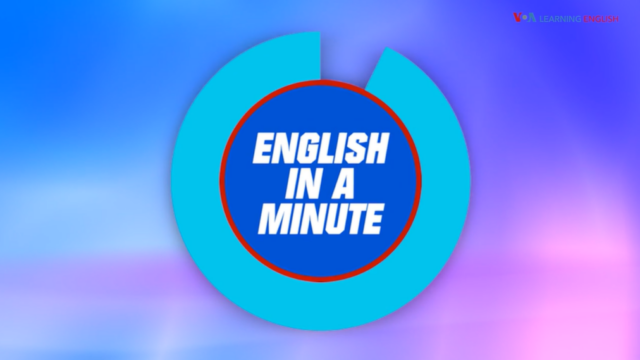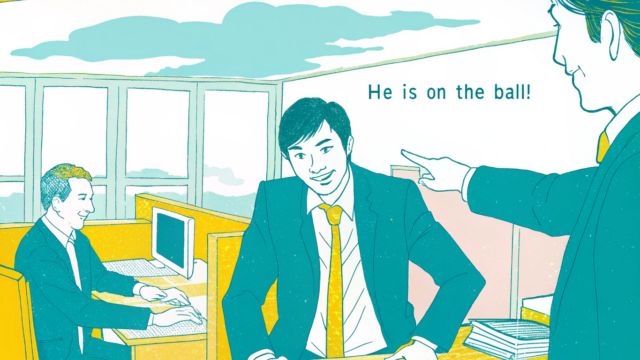【動画のスクリプト】
Welcome to English in a minute. When you make a wish, you hope for something to happen. But what is wishful thinking?
Anna: Dan, guess who’s going to win the lottery tomorrow?
Dan: I don’t know. Anna. You know your chances are like a billion to one.
Anna: I have a good feeling about this one. In fact, I test drove the car that I’m going to buy when I win! What? A little wishful thinking can’t hurt.
Dan: A little wishful thinking?
With wishful thinking, we think or act like our wish is going to come true, even though it probably will not.
I’m with Dan on this one and I really hope Anna isn’t too excited about that new car. And that’s English in a minute.
【動画の日本語訳】
1分英語へようこそ!願いをするとき、何かが起こることを望みますよね。でも、「Wishful thinking」とは何でしょうか?
アンナ: ダン、明日宝くじで誰が当たると思う?
ダン: 分からないよ、アンナ。君の当たる確率は十億分の一だって知ってるよね。
アンナ: この回にはいい予感があるの。実際、当たったら買うつもりの車を試乗までしたしね!え?少しの希望的観測くらい悪くないでしょ。
ダン: 少しの希望的観測?
「Wishful thinking」では、願いが叶うかのように考えたり行動したりします。たとえそれがおそらく叶わないとしても。
この点についてはダンと同意見で、アンナがその新しい車にあまり期待しないことを本当に望みます。以上、1分間英語でした。
【今日の英会話・口語・イディオム表現】
☆ Wishful thinking.
「希望的観測」「現実とは異なる楽観的な考え」
[例文]
A: I heard it’s going to rain all weekend.
B: I’m hoping for sunshine. But I guess that’s just wishful thinking.
[日本語訳]
A: 週末はずっと雨が降るって聞いたよ。
B: 晴れることを期待してるけど、それはただの希望的観測かもね。
[解説]
“Wishful thinking”は英語のイディオムで、「現実とは異なる楽観的な考え」や「希望的観測」という意味になります。
この表現は、現実とは異なる、または現実的でない楽観的な考えや期待を持つときに使われます。たとえば、雨が予想される日に晴れを期待する、または難しい試験に合格することを期待するなど、現実とは異なる期待を持つときにこの表現を使います。
[関連英語表現5]
“In a perfect world…”
「理想の世界では…」
“If only…”
「もし…ならいいのに」
“One can only hope.”
「期待するしかない」
“Keep your fingers crossed.”
「幸運を祈る」
“Hoping against hope.”
「絶望的な状況でも希望を持つ」
[英語解説+日本語訳]
“Wishful thinking” is an idiomatic expression in English that refers to thinking or hoping that something is true or will happen, even though it is unlikely or impossible. It’s a kind of optimistic thinking that doesn’t align with reality. This phrase is often used to describe situations where one’s desires or hopes don’t match the actual circumstances or facts.
「Wishful thinking」という表現は、何かが真実であるか、または起こることを考えたり期待したりすることを指す英語のイディオムです。これは、現実と一致しない楽観的な考えの一種です。このフレーズは、人の願望や希望が実際の状況や事実と一致しない状況を説明するためによく使われます。
[原田英語オリジナル予想問題]
John: I heard that the new cafe downtown is always packed with people.
Mikiko: I’m hoping we can get a table without a reservation. But that might be wishful thinking.
What does the underlined part “But that might be wishful thinking” mean?
a.Mikiko believes they will definitely get a table.
b.Mikiko thinks it’s unlikely they’ll get a table without a reservation.
c.Mikiko has already made a reservation.
d.Mikiko doesn’t want to go to the cafe.
【解答・解説】
解答:b.Mikiko thinks it’s unlikely they’ll get a table without a reservation.
解説:この文の「But that might be wishful thinking」は、Mikikoが予約なしでテーブルを取得することは難しいと考えていることを示しています。選択肢の中で、その意味に最も合致するものは「b.Mikiko thinks it’s unlikely they’ll get a table without a reservation.」です。
日本語訳:
John: 新しいカフェがダウンタウンにオープンしたって聞いたけど、いつも混んでるって聞いたよ。
Mikiko: 予約なしでテーブルが取れるといいんだけど。でも、それは希望的観測かもしれないわね。
Such “unrealistic expectations” are not uncommon. I explained what the CT showed and confirmed there was nothing I nor anyone else could do; she would not recover. He began to sob, head lowered, hands covering his face, as all remaining hope vanished. We took his hands in ours, sat with him, and prayed. What else could we do?
Q: Which of the following is closest in meaning to “unrealistic expectations”?
① fantastic deception ② figment of imagination ③ optical illusion ④ wishful thinking
【日本大学(医)2022】
解答: ④ wishful thinking
解説: 文中の”unrealistic expectations”は、現実的でない期待や希望を意味しています。選択肢の中で、この意味に最も近いのは「④ wishful thinking」です。これは、実現の可能性が低いか、または現実的でない希望や願望を表す表現です。
① fantastic deceptionは「素晴らしい欺瞞」、② figment of imaginationは「想像の産物」、③ optical illusionは「錯覚」を意味しますが、これらは”unrealistic expectations”の意味とは異なります。
日本語訳:
「非現実的な期待」というのは珍しくありません。CTの結果を説明し、私も他の誰も彼女を回復させることはできないことを確認しました。彼はすべての希望が消え去ったとき、頭を下げ、顔を手で覆い、泣き始めました。私たちは彼の手を取り、彼と一緒に座り、祈りました。私たちにできることはそれだけでした。






